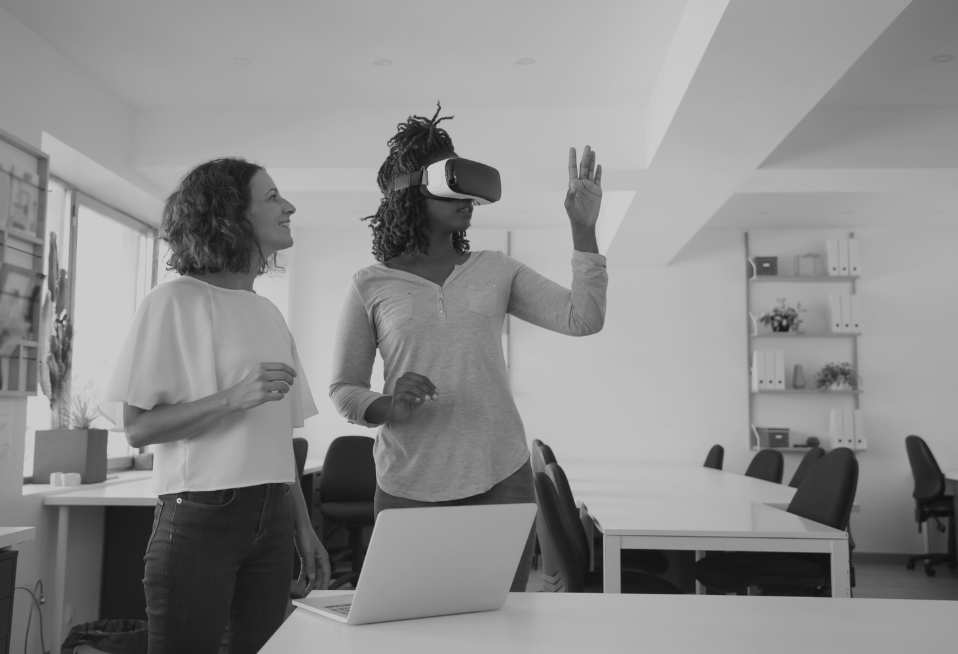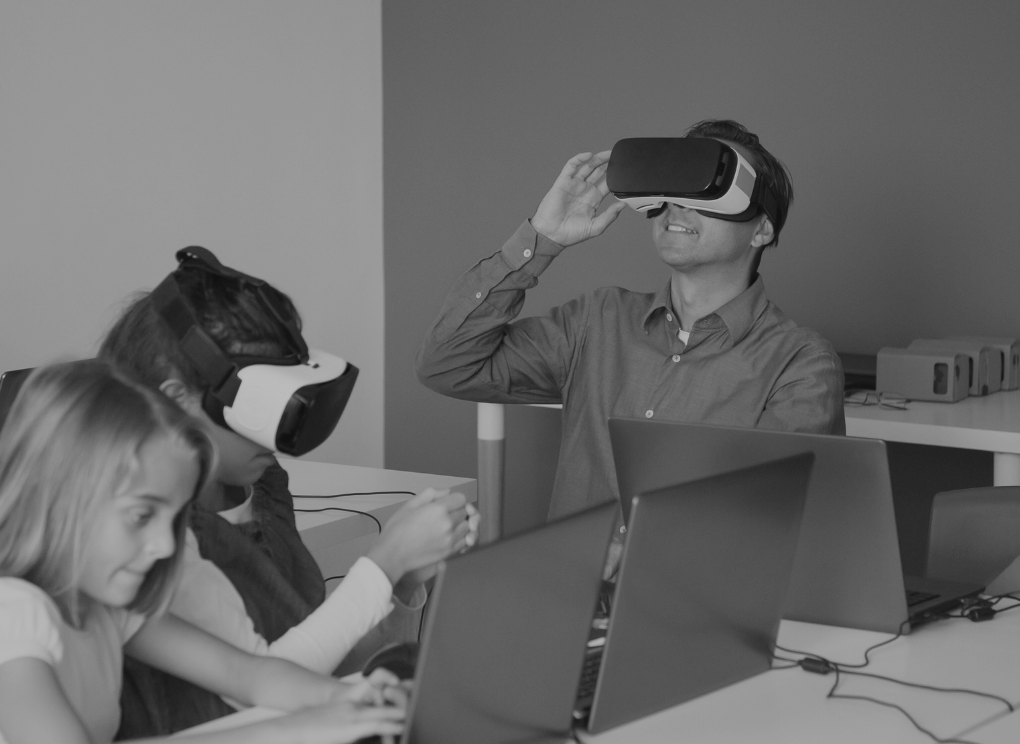
Benefits
The VR Educators and Trainers program is integrated into Education Technology and Instructional Design programs, particularly at the Bachelor's, Master's, and Doctorate levels.
Master VR Teaching
Contrary to popular belief, Lorem Ipsum is not simply random text.
Create Immersive Content
Contrary to popular belief, Lorem Ipsum is not simply random text.
Enhance Student Engagement
Contrary to popular belief, Lorem Ipsum is not simply random text.
Stay Ahead in EdTech
Contrary to popular belief, Lorem Ipsum is not simply random text.
Program in detail
The VR Educators and Trainer is a dynamic and comprehensive professional program designed to equip participants with the essential skills and knowledge required to excel in using Virtual Reality (VR) in education. This program empowers educators and trainers to confidently implement VR technology in their teaching practices, providing insights into the what, how, and why of using VR effectively in education.
Course Objectives
Upon successful completion of this professional program, participants will be able to:
- Articulate the transformative role of VR in
- Identify and operate key VR hardware and software for educational
- Create and develop immersive educational content in a VR
- Manage VR-based courses with student engagement and innovative
Module 1: Foundations of Virtual Reality in Education
Objective: Understand the fundamental concepts of Virtual Reality (VR) and its impact on modern education.
Topics Covered:
- Introduction to Virtual Reality: Definitions, history, and evolution.
- VR vs. AR vs. MR: Understanding immersive technologies in education.
- The role of VR in education: Benefits, challenges, and limitations.
- Case studies: Successful implementation of VR in classrooms and training.
- Ethical considerations and accessibility in VR-based learning.
Practical Activities:
- Explore real-world examples of VR integration in education.
- Identify key challenges and propose solutions for VR adoption in schools.
Key Takeaways:
- Understanding VR's potential in education.
- Ethical use and accessibility of VR technology.
Module 2: Comprehensive Overview of VR Hardware
Objective: Gain an in-depth understanding of VR hardware components and their applications in education.
Topics Covered:
- Overview of VR hardware: Headsets, controllers, sensors, and accessories.
- Comparison of leading VR headsets (Oculus, HTC Vive, Pico, etc.).
- Selecting the right hardware for different educational purposes.
- Setting up and troubleshooting VR devices.
- Future trends in VR hardware for education.
Practical Activities:
- Hands-on experience with various VR hardware.
- Configuring and testing VR hardware for an educational setup.
Key Takeaways:
- Familiarity with different VR hardware and their applications.
- Basic setup and troubleshooting of VR devices.
Module 3: Mastering VR Software and Platforms
Objective: Learn how to use leading VR software to create immersive educational experiences.
Topics Covered:
- Overview of VR development platforms (Unity, Unreal Engine, Mozilla Hubs).
- Exploring VR content creation tools (CoSpaces, Engage, Google Expeditions).
- Evaluating VR applications for different educational contexts.
- Introduction to 360-degree video and virtual field trips.
- User interaction and navigation in VR environments.
Practical Activities:
- Navigating VR software platforms and creating simple VR environments.
- Experimenting with 360-degree videos for education.
Key Takeaways:
- Understanding key VR software and their role in education.
- Ability to create and modify basic VR learning experiences.
Module 4: Designing Immersive Educational Content
Objective: Develop skills in designing and delivering effective VR-based lessons.
Topics Covered:
- Principles of immersive learning design.
- Storytelling and narrative techniques for VR education.
- Creating interactive and engaging VR lesson plans.
- Aligning VR content with curriculum standards and learning objectives.
- Assessing student learning in a VR environment.
Practical Activities:
- Developing a VR-based lesson plan.
- Designing interactive learning activities using VR tools.
Key Takeaways:
- Best practices for creating VR learning experiences.
- Ability to align VR lessons with educational goals.
Module 5: Integrating VR into Teaching Practices
Objective: Learn how to implement VR effectively in different educational settings.
Topics Covered:
- Strategies for introducing VR in traditional and online classrooms.
- Managing student interaction and engagement in VR.
- Overcoming challenges in VR integration (cost, training, technical barriers).
- Evaluating the effectiveness of VR-enhanced teaching.
- Future directions: The role of AI and VR in education.
Practical Activities:
- Creating a plan for integrating VR into a specific subject or course.
- Evaluating case studies of VR-enhanced teaching.
Key Takeaways:
- Practical strategies for incorporating VR into lesson plans.
- Understanding potential challenges and solutions for VR implementation.
Module 6: Capstone Project – Developing a VR-Enhanced Learning Experience
Objective: Apply acquired knowledge to design and present a VR-based educational project.
Project Scope:
- Participants will develop a VR-integrated lesson plan or course module based on real-world educational needs.
- The project will demonstrate creativity, technical skills, and pedagogical alignment.
Project Steps:
- Planning: Identify a topic and define learning objectives.
- Development: Utilize VR tools to create an immersive learning experience.
- Implementation: Test and refine the VR content.
- Presentation: Showcase the final project to peers and instructors for feedback.
Key Takeaways:
- Hands-on experience designing and implementing VR lessons.
- Confidence in using VR for impactful teaching.
Certification
Participants who successfully complete the program and achieve a passing score on their VR-enhanced lesson plan will be awarded the "Certified Professional VR Educator and Trainer" certification, issued by the VirtualWorld Institute (VWI), USA, in partnership with SIMI Swiss.
Certification Validity:
- The certification is valid for three (3) years.
- Participants may apply for an extension by fulfilling specific eligibility requirements.
Sign Up for a Free Consultation
Send us your information to book a consultation via Messenger or WhatsApp.

SIMI Swiss Official
SIMI Swiss is the first higher education institute in Zug, Switzerland, and the owner of the AI Institute of Switzerland.
SmartUni Strategy
AI Institute of Switzerland is a key part of SIMI Swiss's Smart University strategy, implemented across all operations.









